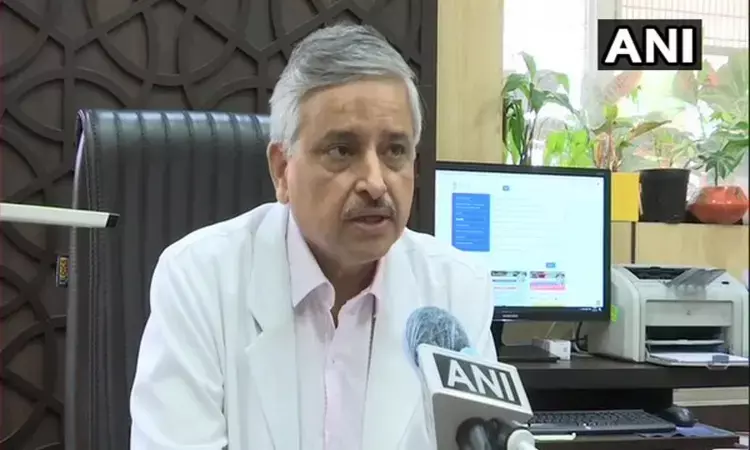- Home
- Medical news & Guidelines
- Anesthesiology
- Cardiology and CTVS
- Critical Care
- Dentistry
- Dermatology
- Diabetes and Endocrinology
- ENT
- Gastroenterology
- Medicine
- Nephrology
- Neurology
- Obstretics-Gynaecology
- Oncology
- Ophthalmology
- Orthopaedics
- Pediatrics-Neonatology
- Psychiatry
- Pulmonology
- Radiology
- Surgery
- Urology
- Laboratory Medicine
- Diet
- Nursing
- Paramedical
- Physiotherapy
- Health news
- Fact Check
- Bone Health Fact Check
- Brain Health Fact Check
- Cancer Related Fact Check
- Child Care Fact Check
- Dental and oral health fact check
- Diabetes and metabolic health fact check
- Diet and Nutrition Fact Check
- Eye and ENT Care Fact Check
- Fitness fact check
- Gut health fact check
- Heart health fact check
- Kidney health fact check
- Medical education fact check
- Men's health fact check
- Respiratory fact check
- Skin and hair care fact check
- Vaccine and Immunization fact check
- Women's health fact check
- AYUSH
- State News
- Andaman and Nicobar Islands
- Andhra Pradesh
- Arunachal Pradesh
- Assam
- Bihar
- Chandigarh
- Chattisgarh
- Dadra and Nagar Haveli
- Daman and Diu
- Delhi
- Goa
- Gujarat
- Haryana
- Himachal Pradesh
- Jammu & Kashmir
- Jharkhand
- Karnataka
- Kerala
- Ladakh
- Lakshadweep
- Madhya Pradesh
- Maharashtra
- Manipur
- Meghalaya
- Mizoram
- Nagaland
- Odisha
- Puducherry
- Punjab
- Rajasthan
- Sikkim
- Tamil Nadu
- Telangana
- Tripura
- Uttar Pradesh
- Uttrakhand
- West Bengal
- Medical Education
- Industry
Avoid intake of hydroxychloroquine sans doctors approval: AIIMS Director

New Delhi - AIIMS Director Dr Randeep Guleria recently warned the general public against the use of hydroxychloroquine, an anti-malarial drug deemed to be useful in dealing with COVID-19, without proper approval from doctors, stating that it can be harmful leading to an irregular heartbeat.
"Some lab data show that hydroxychloroquine may have some effects on COVID-19 patients.
But the data are not that strong. Experts at ICMR felt that it may be helpful in close contacts of COVID-19 patients and healthcare workers taking care of the patients," Dr Guleria told ANI.
Read Also: No, dead bodies don't spread Coronavirus: AIIMS clears air after cremation controversy
He stressed that hydroxychloroquine (HCQ) is not a treatment for everyone, stating that the expert group in India and ICMR looked in this data and thought this may be useful in people who are healthcare workers managing COVID-19 patients or those who are in close contact with everyone.
"This drug also has side-effects. HCQ can have cardiac toxicity leading to an irregular heartbeat. Like any other drug, this also has side effects. It can do more harm than good for the general public. So, taking it without any indication can lead to problem also," he said.
Speaking about the use of a combination of HCQ and Azithromycin by doctors to treat COVID-19 patients, he said, "Studies in China and France say that combination of HCQ and Azithromycin may be helpful if given to COVID-19 patients with moderate to severe illness.
The data from the studies are not strong. Since no other treatment is available, it was felt that it should be used."
With the surge in demand for hydroxychloroquine, the pharmaceutical industry has produced 20 crore HCQ tablets this month, said Pankaj Patel, CEO of Zydus Cadila in Ahmedabad, on Saturday.
Several countries have requested India for the supply of the said drug even as the globally confirmed cases of the virus, which originated in China's Wuhan last year, has surpassed 1.5 million.
India has cleared the first list of 13 countries for hydroxychloroquine which includes the USA, Spain, Germany, Bahrain, Brazil, Nepal, Bhutan, Sri Lanka, Afghanistan, Maldives, and Bangladesh.
The US had asked for 48 lakh tablets of HCQ and India has sanctioned 35.82 lakh tablets, sources said.
Meanwhile, the AIIMS Director has further stated that there is no data to show that humans can contract coronavirus from their pets. He told ANI: "Though coronavirus is present in both animals and humans, there is no data to suggest that pets can spread COVID-19. The spread of COVID-19 is mainly from human to human."
He further said, "Unlike the MERS (Middle East Respiratory Syndrome) and SARS (Severe Acute Respiratory Syndrome) -- where the virus jumped from animals and became a human virus -- the novel coronavirus is now mainly a human virus and it can spread only from human to human. Chances of its spread from pets to humans are very unlikely."
"So, having pets at home is safe," he added.
Amid the current panic situation created around the spread of novel coronavirus, reports of people abandoning their pets have been doing the rounds.
Read Also: Coronavirus Impact: Medical Council of India eases Internship path for MBBS graduates
Garima joined Medical Dialogues in 2017 and currently works as the Senior Editor. She oversees coverage of all healthcare topics, with a focus on medico-legal cases, regulatory updates, decisions by NMC, DCI and medical councils, developments in medical education, government policies, and news on medical and dental colleges. She holds a Master’s degree in Journalism and Mass Communication and can be contacted at editorial@medicaldialogues.in | 011-43720751.


